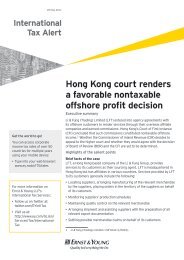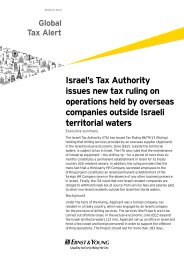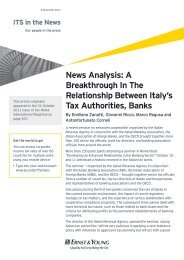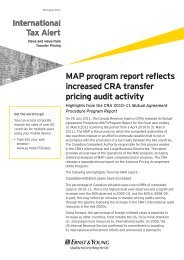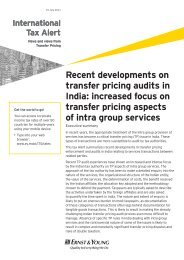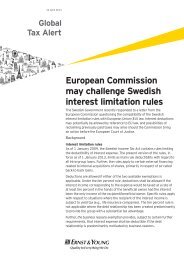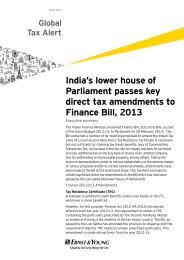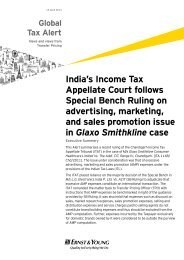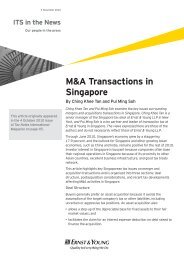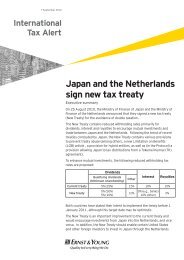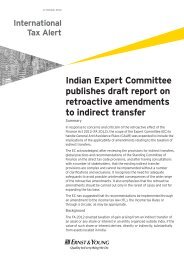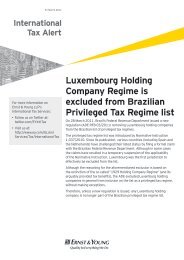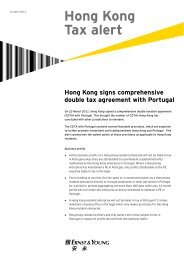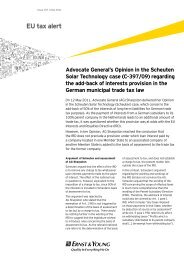Download - Ernst & Young T Magazine
Download - Ernst & Young T Magazine
Download - Ernst & Young T Magazine
You also want an ePaper? Increase the reach of your titles
YUMPU automatically turns print PDFs into web optimized ePapers that Google loves.
Stephan Kuhn<br />
Your feedback<br />
We work hard to make<br />
T <strong>Magazine</strong> useful and<br />
informative for our readers.<br />
But we would value your<br />
views on what we could do<br />
better. Feedback can be<br />
provided via the feedback<br />
form in this publication<br />
or a brief online survey,<br />
available here:<br />
www.ey.com/tmagazine/<br />
survey<br />
Dear Reader<br />
By Stephan Kuhn Editorial<br />
The growing emergence<br />
of a “new global<br />
executive”<br />
Recruiting and retaining talent is a perennial challenge for any multinational business. In rapidgrowth<br />
markets, there is already intense competition for relatively small numbers of highly skilled<br />
and experienced workers, especially within middle and upper management, despite huge<br />
numbers of new graduates emerging each year. In developed markets, multinational businesses<br />
are grappling with other challenges: an aging workforce as a result of demographic change,<br />
and all too often a disconnect between the skills of the labour force and those that businesses<br />
need to succeed.<br />
Addressing these talent mismatches requires companies to think carefully about how they<br />
manage their human capital on a global basis. For many, the greater use of overseas postings is<br />
an important tool for filling talent gaps and transferring best practice around the world.<br />
Gaining experience in other markets is also a crucial part of management development, helping<br />
high-potential employees to develop the international experience and cultural understanding<br />
that will enable them to lead tomorrow’s global business. Can tomorrow’s CEO be someone without<br />
deep, first-hand knowledge of today’s rapid-growth markets?<br />
In recent years, the pattern of international postings has evolved. Traditional expatriate models,<br />
whereby companies relied on the experience of managers from developed markets to establish<br />
operations in rapid-growth economies are now just one part of the mix. Today, there is<br />
a much more fluid, dynamic approach to the migration of talent, with executives also moving<br />
from rapid-growth to developed markets, and also from one rapid-growth market to another.<br />
The emergence of a new generation of “global executives”, while beneficial for the business overall,<br />
presents companies with many challenges from a tax perspective. Different rates of income<br />
tax around the world can make it difficult for companies to create remuneration structures that<br />
equalize liabilities between jurisdictions. A related challenge here lies in crafting incentive<br />
structures that motivate global executives, without creating a mismatch between them and local<br />
workers. Beyond this, social security obligations and pension entitlements, complex enough in<br />
many jurisdictions, become even more challenging to manage for mobile employees. In addition,<br />
meeting the challenges of housing, schooling for children and potentially work assistance for<br />
spouses present complications. Obtaining appropriate residential and working permits are also<br />
critical steps in managing risks for both the firm and employees. Even employees who are not<br />
based overseas can present problems because they may trigger local tax liabilities if they travel<br />
frequently enough.<br />
In this issue of T <strong>Magazine</strong>, we look at the emergence of a new generation of “global executives”,<br />
either traveling frequently, or else shifting from one international posting to the next. We<br />
consider how companies are developing global talent management processes to build talent<br />
pipelines for the future, and explore the tax implications of this increasingly mobile workforce.<br />
We hope that you find the publication valuable and stimulating.<br />
Stephan Kuhn<br />
Stephan Kuhn is Area Tax Leader for the Europe, Middle East, India and<br />
Africa (EMEIA) region at <strong>Ernst</strong> & <strong>Young</strong>.<br />
<strong>Ernst</strong> & <strong>Young</strong> Issue 07 T <strong>Magazine</strong> 3



